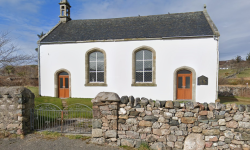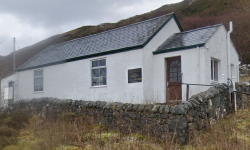A Durness Fellowship Meeting
From Thomas Brown, Annals of the Disruption, Edinburgh, 1876, p668-673:
Sometimes these Friday gatherings were held in the open air, and the following vivid sketch1 from the graphic pen of the Rev. Eric Findlater (Lochearnhead) will enable the reader to picture the scenes which were witnessed on such occasions. He is describing the meeting in his father’s parish of Duirness, Sutherlandshire, as it used to be before the Disruption, and as it continued to be afterwards, with a change of place to the Free Church:
“The old parish church of Duirness stands on a very picturesque spot. It is an ancient cross-shaped building, roofed with grey slate, and surrounded by the churchyard or burying-ground, which is thickly studded with graves and grave-stones, and over-looked by an ancient manor house, once the dwelling of the Barons of Reay. It is a July day, bright and warm and beautiful, and Balnakeel with its wide bay is seen to the best advantage. On the shore everything is green as an emerald — the wild flowers in full blow. If you look seaward you could perceive the white ships of various sizes, some under a full press of sail, standing out for the wide Atlantic, carrying perhaps to our distant colonies those who are now casting a last fond look on the bold coast of their native Scotland — others lying to, fishing among the shoals of cod that frequent the coast. If you turn your eye landward there is a range of hills — some of them upwards of 3000 feet in height — encircling the parish and standing as its giant guardians. In the churchyard, with its back to an old monument, stands the tent (pulpit), and before it are stones, stools, and various kinds of seats for the people. Shortly after ten o’clock they may be observed making their appearance in twos and threes, generally the old and those from other parishes coming first to the place of meeting, and by-and-by these tiny streams, by accessions at every point, soon increase until at the two gates of the churchyard they flow in like a river. And you could observe the solemnity that spread itself over them all. This is not like an ordinary assemblage. The step, even of the elastic young, is slower and more staid, and all neither converse so much nor in so loud a tone as on other occasions. ‘The Men’ — i.e., those of an established religious character — are evidently, though unconsciously, the teachers ; for as one or two of them walk slowly together— first, young inquirers might be seen at their side, silent auditors of the words falling from their lips; and next, the young and the thoughtless, by their proximity to such characters, subduing much of their thoughtlessness. At length the bell in the old belfry announces that the clergymen are at hand, at the hearing of which such as may have previously been conversing or standing in groups become silent and betake themselves to a seat —some sitting upon the grave-stones and others upon the graves, with a part of their plaids under them, and the remainder drawn over their face to screen them from the sun. The bell tolls again, and the ministers enter the tent (pulpit), threading their way cautiously, each hat in hand, through the lane of human beings before them. The oldest minister rises and gives out a portion of a psalm, in the singing of which all join. He then offers up an impressive and suitable prayer. After a short pause he again gets up, and briefly alluding to the well-known services of that day being one set apart for Christian conference, he asks if any of the people of God then present have a portion of Scripture upon which they would like to get the opinion of their fellow-Christians. Sometimes there is a considerable pause, while the silence is such that you could hear the twittering of the sparrow that sits upon the church roof — all eyes however are anxiously looking round. At length some Christian gets up and mentions some passage — such as, ‘Blessed are they that hunger and thirst after righteousness, &c.,’ and wishing to have the Scriptural marks of such. Thus, then, the question is fairly launched. The presiding minister having turned up the passage, announces it again to the people, and opens it by making a few pertinent remarks as an introduction, and indicating the line of discussion which it is expected will be followed. He then calls upon such and such a man — some Christian from a neighbouring parish — to rise and give his opinion on the subject. This he generally at the first request refuses, but being told that he is setting a bad example for the day, he agrees; and having smoothed down his hair, adjusted his mantle or plaid, and taking his staff, he gets up looks round, professes his own unsuitableness for the service, but gives what he thinks are true marks — generally from his own experience — and to this it is owing that there is generally so little hesitation in these extempore effusions. It is not theoretical but practical Divinity that is given forth, and that with an unction and a pathos that clearly shows they have not learned from books, but that they speak as they believe, and because they believe they have been taught of the Holy Ghost.
“A word in regard to the audience. It might amount to upwards of 1000, and of all ages. There might be seen an occasional sheep farmer, if a native of the district, but never a factor. There might also be seen the old and hardened in sin and the thoughtless youth; in short, the various elements of which an ordinary congregation is composed. As the speakers seldom exceeded a quarter of an hour each, there was no occasion for the attention to flag, and the variety kept it up during the whole time, which was from three to five hours according to circumstances. . . .
If you will not be fatigued, I will continue my sketch : and here let me remind you that the individuals I mention are no fanciful creation, and that I give their real names, and, so far as I am able, their real characters. Many of them, alas! have gone to join the general assembly on high, but there are some of them still [1858] living. ‘Is Niel Bain from Assynt here?’ asks the moderator, as he scans the faces of the congregation; all eyes instinctively are pointed to the spot where the worthy man is seated. Then, assured by this that he is, he says, “Niel, will you speak to the question?” The individual thus appealed to unhesitatingly gets up — for he is a man in whose very countenance there is exemplified that ‘perfect love which casteth out fear.’ He is an aged man with a head bald on the top but encircled with a wreath of silvery hair. His eye is blue, his face round, his complexion clear, and a beautiful smile lights up not only his mouth but his countenance. He is dressed in a blue coat with gilt buttons, and in corduroy shorts, and over all is thrown a blue cloth mantle with a deep cape. He has no difficulty in speaking to the question —he speaks con amore —not for the love of speaking, but from his love to the subject which is treated of. I could not in those years resist a tendency I felt to associate the personal appearance of such ‘Men’ with some of the Scripture characters, and worthy Niel Bain was to my imagination the beau ideal of the apostle John the loving disciple. What he spoke had a wonderfully telling influence, for you felt he did not speak about the truth — he gave forth that which had permeated the faculties of his own soul.
“If Niel was the personification of the apostle John —the next who gets up, Angus Calder [Kinlochbervie], is a very different person. He had what you would conceive as having been the look of Ezekiel. He was a tall dark-complexioned man, with a countenance which seemed as if cast in bronze, a sharp black eye deeply set in the head and surmounted by shaggy eyebrows. His hair was long and dark- brown, and he wore a greatcoat made of homespun cloth. His look was downcast, his voice was deep but not harsh, and though he knew the greatest of all the graces, like the individual who preceded him, he did not choose to follow this path. He took a deeper and darker one, and had a sort of morbid delight in revisiting the Slough of Despond, in again unmasking the hypocrites he had met with in his journey, or in threading again the labyrinth out of whose miry clay his own feet had been extricated you felt that before you stood one who had deep experience in the Christian warfare.
“Who is that man who has just concluded that remarkable prayer towards the middle of the service? His name is Andrew Ross. He is a native of Ross-shire, but has been residing in the parish of Tongue during the greater part of his long life. As you may perceive, his outward man is now failing; but the inward is growing day by day. The shock of corn is fully ripe, and may at any time be brought to the garner above. He is one of the most spiritually minded men in the north. Did you not observe the extraordinary nearness of access which he had to God in that prayer which he has just offered up, and the peculiar expression he made use of in addressing the Almighty? — ‘Everlasting Love’ —and as often as the word escaped his lips the whole physical frame became agitated, his voice became choked, and his eyes rained down tears but they were not the tears of remorse, but those of over-powering love. He is one whose spirit longs to be with Christ, which is far better — its very workings after emancipation will soon loose the pins of the frail tabernacle, and the soul of the man who stands before you will then find itself at rest and at home.
“George Campbell [Scourie], a Gaelic schoolmaster, and a native of Sutherland, renews the discussion. He is a man about sixty, dressed in a camlet cloak, and with a head of long steel-grey hair, parted in the midst, and falling down in a mass behind. His features are well proportioned, and a quick intelligence courses over them as the aurora borealis does across his native sky. He is one of nature’s orators; and so well toned was his voice, so harmonious his periods, and so graceful his action, that it was like music to the ear. But all this was sanctified; and as he discourseth of what the Lord had done for his soul, they would be indifferent indeed who could do else than listen; and though in general he showed the harmlessness of the dove, there were occasions when he could testify that he had the spirit of the lion. If he had but occasion to allude to ‘Radical’ [Separatist] principles, his denunciation of them had something tremendous about it. Our testimony to him would infer that he was a man who knew divinity not only experimentally but systematically.”
Such were the Friday meetings and the men by whom they were conducted. The object was to prepare the minds of the people for engaging with benefit to themselves in the services which followed.
1Disruption Mss. LVI.

